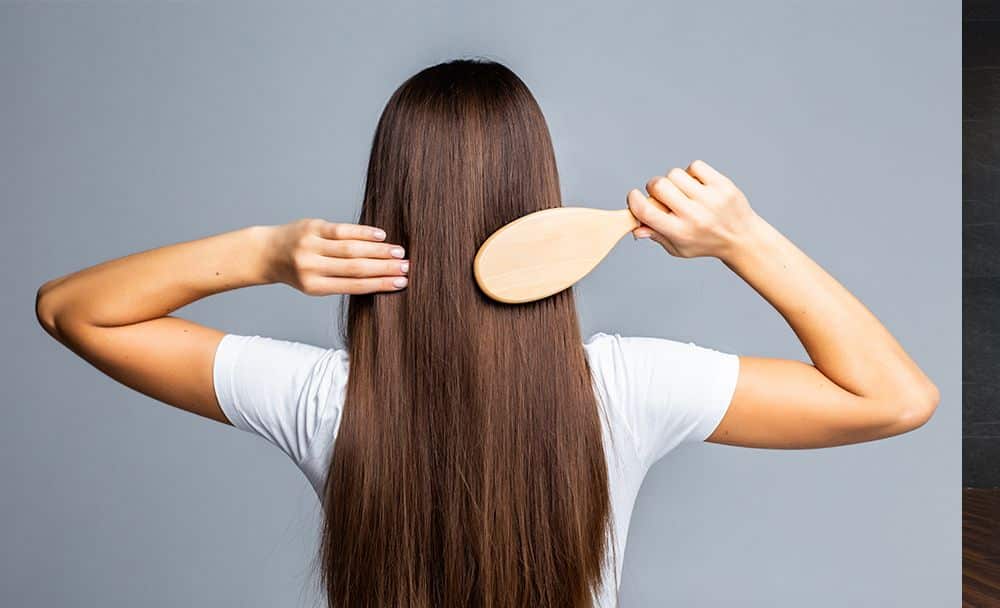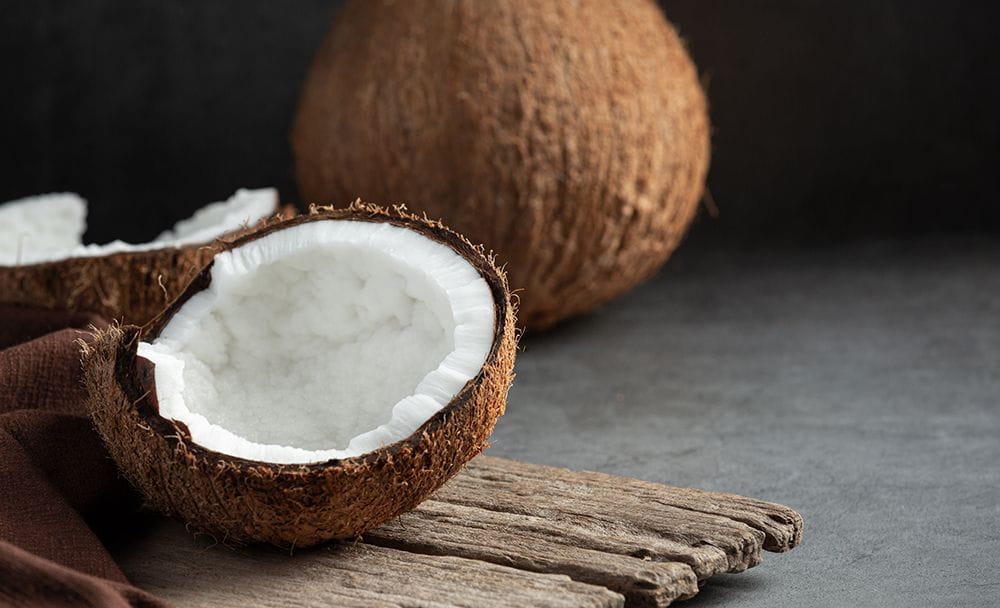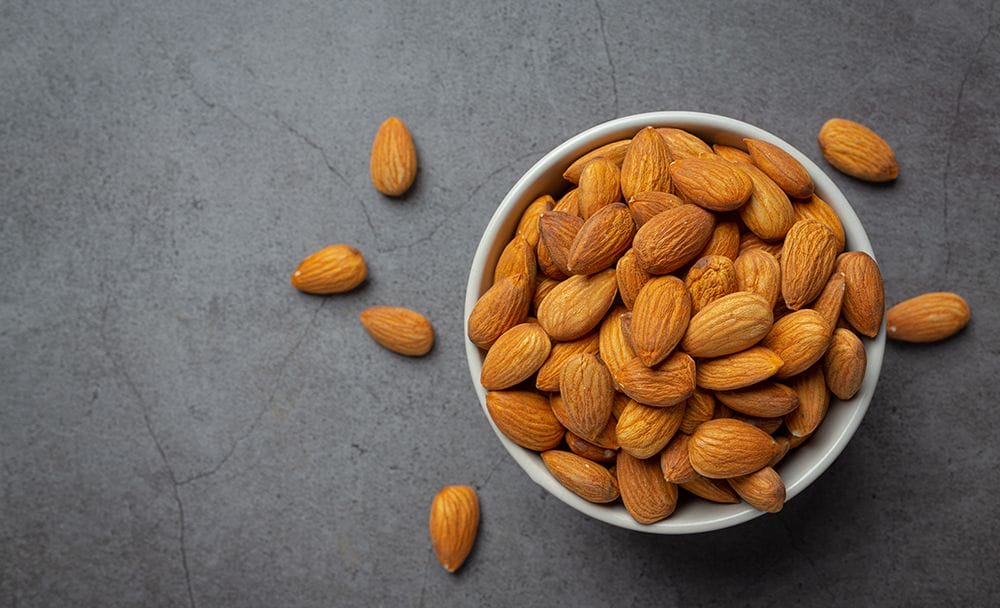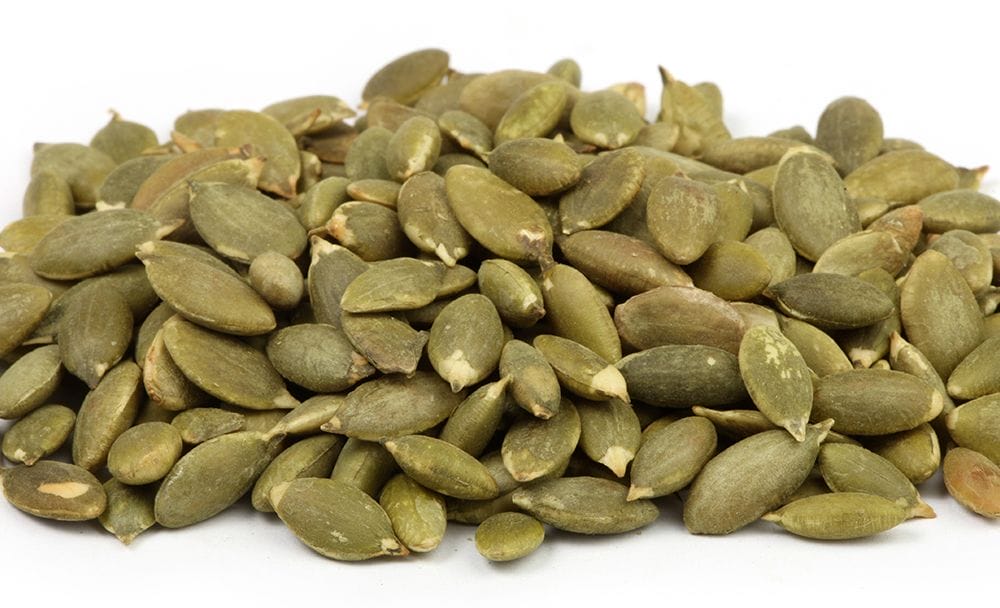
Beautiful, lustrous hair has always been considered a symbol of health and vitality. In Ayurveda promoting hair health is not only about external treatments but also about nourishing the body from within. Ayurveda emphasises the connection between food and overall well-being, and there are several foods known for their ability to support stronger and healthier hair. In this article, we will explore the 15 such top foods that can help your locks look more vibrant and nourished.
Here are the Top 15 foods for Stronger & Healthier Hair:
1. Amla (Indian Gooseberry)

Amla, a powerhouse of Vitamin C and antioxidants, is revered in Ayurveda for its role in promoting hair growth and reducing premature greying. Amla nourishes the hair follicles, strengthens the roots, and prevents breakage. [1] [2]
Amla is also known for being a natural diuretic, laxative and liver tonic. It can be consumed in various forms, such as fresh fruit, juice, or powder. [1] [2]
2. Coconut

While the benefits of using coconut oil topically for hair care are well-known, it is also good for consumption to improve hair health. Coconut milk and coconut water are packed with essential fatty acids that nourish and moisturise the hair, leaving it smooth and glossy. [3] [4]
is also known for having antibacterial, antifungal, antioxidant, antiparasitic, antiviral, and many other qualities. [3] [4]
3. Almonds

Almonds are high in biotin content, which helps in strengthening the hair shafts and preventing brittleness. Additionally, almonds’ abundance of Vitamin E provides a natural shine to the hair. [5]
Almonds are also a great source of Vitamin B2. [5]
4. Spinach
Spinach is a superfood for hair due to its high iron and Vitamin C content. Iron deficiency is linked to hair loss, and spinach can help replenish iron levels, leading to healthier hair growth. [6]
Spinach also has additional benefits in skincare, improving eyesight, regulating blood pressure, strengthening muscles, and preventing age-related macular degeneration and haemophilia. [6]
5. Sesame Seeds
Sesame seeds are a powerhouse of nutrients like magnesium, calcium, and zinc, which are essential for maintaining a healthy scalp and promoting strong hair. [7]
It is also known for being a rich source of protein and lowering cholesterol and blood pressure levels. [7]
6. Curry Leaves
Curry leaves are a staple in Ayurvedic cooking and are known for their ability to prevent premature greying of hair. They are rich in antioxidants and essential nutrients that nourish the hair roots. [8]
It is also helpful for women undergoing treatment for calcium deficiency and osteoporosis. [8]
7. Pumpkin Seeds

Pumpkin seeds are an excellent source of zinc, which plays a crucial role in strengthening hair follicles and preventing hair loss. [9]
Pumpkin seeds are also a good source of protein and have pharmacological properties of being anti-diabetic, antifungal, antibacterial and anti-inflammatory. They are also a good source of antioxidants. [9]
8. Sweet Potatoes
Sweet potatoes are rich in beta-carotene, a precursor of Vitamin A, which aids in the production of sebum, the natural oil that keeps the scalp and hair hydrated. [10]
It also has cardioprotective, anti-inflammatory, anti-cancer, anti-diabetic, anti-microbial, and anti-obesity effects on the body. Sweet potatoes also help in the prevention of vitamin A deficiency. [10]
9. Yoghurt
Yoghurt is a probiotic-rich food that promotes a healthy gut environment. A balanced gut contributes to better nutrient absorption, which indirectly benefits hair health. [11] [12]
Yoghurt is also well-known for improving digestion, enhancing the immune system, helping in the treatment of gastrointestinal disorders, improving lactose tolerance and being a rich source of Calcium.[13]
10. Guava
Guavas are packed with Vitamin C, which aids collagen production, essential for maintaining hair structure and strength. [14]
The fruit also has laxative, immunity-boosting and cardioprotective properties. [14]
11. Lentils
Lentils are a great source of protein, iron, zinc, and biotin, all vital nutrients for hair growth and overall hair health. [15]
They are also a rich source of protein and antioxidants and known for being functional foods. It has also been strongly suggested that eating pulses(a type of lentil) can help in the prevention and management of diabetes. [16]
12. Oranges
Oranges are another Vitamin C-rich food that aids in collagen production and supports healthy hair growth. [17]
It is also a good source of Vitamin A, Carotenoids and dietary fibre. [18]
13. Bhringraj (Eclipta Alba)
Bhringraj is a well-known Ayurvedic herb often used in hair oils and tonics. Rich in nutrients like iron, Vitamin E, and polypeptides, Bhringraj which is also available in powder form, helps improve blood circulation to the scalp, stimulating hair growth and maintaining its natural colour. [19] [20]
Bhringraj also has anti-ageing properties and is known for improving one’s sight, hearing, memory, bones and teeth. [19]
14. Brahmi (Bacopa Monnieri)
Brahmi is known for its variety of benefits and is also beneficial for hair health. It calms the mind and reduces stress, a significant factor in hair loss. Brahmi indirectly contributes to healthier hair growth by promoting a balanced state of mind. [21]
Brahmi is especially well-known for improving cognitive function and mental wellness for people who consume it. [21]
15. Fenugreek (Methi)
Fenugreek seeds are a rich source of protein, iron, and folic acid, making them excellent for hair nourishment and promoting hair growth. Fenugreek also helps control dandruff and soothes an itchy scalp. You can include dry or fresh methi in your food or consume it in powdered or capsule form easily. [22]
Methi is also helpful for managing diabetes, high cholesterol levels and improving digestion. [22]
FAQs
Can dietary changes alone improve hair health in Ayurveda?
Ayurveda emphasises the significance of a balanced lifestyle, including dietary changes, stress management, and proper hair care practices. Combining these elements can lead to improved hair health and overall well-being.
How can Brahmi be consumed?
Brahmi powder can be consumed with 10-25ml of warm or cold water daily for adults. Brahmi can also be consumed more easily in capsule form.
How often should these foods be consumed for noticeable results?
Consistency is key when incorporating foods for hair health. Including these food items regularly in your diet can yield more noticeable results over time. However, individual results may vary based on factors like genetics, existing hair conditions, and overall health.
Can these foods be used alongside other hair care treatments or medications?
Yes, these foods can be used alongside other hair care treatments or medications. However, it is essential to consult with a healthcare professional or an Ayurvedic practitioner to ensure there are no potential interactions or contraindications.
Are there any side effects associated with Ayurvedic foods for hair health?
In general, Ayurvedic foods are safe when consumed as part of a balanced diet. However, individuals with specific allergies or medical conditions should exercise caution and seek professional advice before making significant dietary change
Conclusion
Incorporating these foods into your diet can significantly contribute to stronger, healthier, and more lustrous hair. Remember that Ayurveda emphasises overall wellness, so combining a balanced diet with proper hair care practices and a stress-free lifestyle can work wonders for your hair health.
Disclaimer: This Article is for informative purposes only and does not constitute medical advice. Kindly contact a medical professional before attempting any treatments mentioned in the article yourself.
References:
- Medicinal plants for skin and hair care (niscpr.res.in)
- Current Trends in the Research of Emblica officinalis (Amla): A Pharmacological Perspective(globalresearchonline.net)
- Coconut-oil-A-review.pdf (researchgate.net)
- The use of coconut in rituals and food preparations in India: a review | Journal of Ethnic Foods (biomedcentral.com)
- Biological-importance-of-vitamins-for-human-health-A-review(researchgate.net)
- Spinach Expert System: Diseases and Symptoms (researchgate.net)
- Nutritional, Medicinal and Industrial Uses of Sesame (Sesamum indicum L.) Seeds – An Overview (researchgate.net)
- Curry Leaves – A Medicinal Herb (indianjournals.com)
- Proximate, Mineral and Anti-nutrient Composition of Pumpkin ( Cucurbitapepo L) Seeds Extract (researchgate.net)
- Sweet potatoes – Splendid benefits (indianjournals.com)
- Frontiers | Intermediate role of gut microbiota in vitamin B nutrition and its influences on human health (frontiersin.org)
- Lactose and lactose derivatives as bioactive ingredients in human nutrition – ScienceDirect
- The evolution, processing, varieties and health benefits of yogurt(researchgate.net)
- Food and Scientific Reports 1(1): 1-15: January 2020 (researchgate.net)
- Review on Hair Problem and its Solution | Journal of Drug Delivery and Therapeutics (jddtonline.info)
- Lentils (Lens culinaris, L.): A Novel Functional Food (researchgate.net)
- Role of Vitamin C in Body Health (indianjournals.com)
- Potential Nutritional Benefits of Current Citrus Consumption(researchgate.net)
- Pharmacological and therapeutic importance of Eclipta alba (Bili garuga): A review (phytojournal.com)
- Eclipta Alba (Bhringraj): A Promising Hepatoprotective And Hair Growth Stimulating Herb(semanticscholar.org)
- Brahmi- “The Herb Of Enlightenment” (wjpr.net)
- Fenugreek (Trigonella foenum-graecum L.) As a Valuable Medicinal Plant(researchgate.net)




















